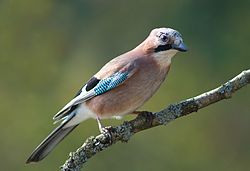сойка
Belarusian
Pronunciation
Noun
со́йка • (sójka) f animal (genitive со́йкі, nominative plural со́йкі, genitive plural со́ек)
- jay (bird)
Declension
| singular | plural | |
|---|---|---|
| nominative | со́йка sójka |
со́йкі sójki |
| genitive | со́йкі sójki |
со́ек sójek |
| dative | со́йцы sójcy |
со́йкам sójkam |
| accusative | со́йку sójku |
со́ек sójek |
| instrumental | со́йкай, со́йкаю sójkaj, sójkaju |
со́йкамі sójkami |
| locative | со́йцы sójcy |
со́йках sójkax |
| count form | — | со́йкі1 sójki1 |
1Used with the numbers 2, 3, 4 and higher numbers after 20 ending in 2, 3, and 4.
Bulgarian


Etymology
From Proto-Slavic *sojьka. Morphologically equivalent to со́а (sóa) (dialectal) + -ка (-ka).
Pronunciation
Noun
со́йка • (sójka) f
- jay (bird of genus Garrulus (for Old World jays) or Cyanocitta (for New World jays))
Declension
| singular | plural | |
|---|---|---|
| indefinite | со́йка sójka |
со́йки sójki |
| definite | со́йката sójkata |
со́йките sójkite |
| vocative form | со́йко sójko |
со́йки sójki |
Alternative forms
Hyponyms
- еврази́йска со́йка (evrazíjska sójka, “Eurasian jay, Garrulus garrulus”)
- си́ня со́йка (sínja sójka, “blue jay, Cyanocitta cristata”)
Related terms
- сое (soe, “lighted place”) (obsolete)
- со́йна (sójna, “adder (snake)”) (dialectal)
- со́керица (sókerica, “spotted nutcracker”)
References
- “сойка”, in Речник на българския език (in Bulgarian), Sofia: Bulgarian Academy of Sciences, 2014
- “сойка”, in Речник на българския език (in Bulgarian), Chitanka, 2010
- Todorov, T. A., Racheva, M., editors (2010), “сойка¹”, in Български етимологичен речник (in Bulgarian), volume 7 (слòво – теря̀свам), Sofia: Prof. Marin Drinov Pubg. House, →ISBN, page 286
Russian
Etymology
Inherited from Proto-Slavic *sojьka. By surface analysis, со́я (sója, “jay (dialectal)”) + -ка (-ka). Cognate with Ukrainian со́я (sója), Belarusian со́я (sója), Bulgarian со́йка (sójka), Serbo-Croatian со̑јка, Slovene sȏjka (“type of jackdaw”) (tonal orthography), Czech sojka (“jay”), Slovak sojka (“jay”), Polish soja (also sójka), Upper Sorbian soja. Per Vasmer, presumably related to Russian сия́ть (sijátʹ, “to shine”), based on the colorful feathers.
Pronunciation
Noun
со́йка • (sójka) f anim (genitive со́йки, nominative plural со́йки, genitive plural со́ек)
- Eurasian jay (Garrulus glandarius)
Declension
Derived terms
- мексика́нская со́йка (meksikánskaja sójka)
References
- Vasmer, Max (1964–1973) “сойка”, in Oleg Trubachyov, transl., Этимологический словарь русского языка (in Russian), Moscow: Progress
Ukrainian
Pronunciation
Noun
со́йка • (sójka) f animal (genitive со́йки, nominative plural со́йки, genitive plural со́йок)
- jay (bird)
Declension
| singular | plural | |
|---|---|---|
| nominative | со́йка sójka |
со́йки sójky |
| genitive | со́йки sójky |
со́йок sójok |
| dative | со́йці sójci |
со́йкам sójkam |
| accusative | со́йку sójku |
со́йки, со́йок sójky, sójok |
| instrumental | со́йкою sójkoju |
со́йками sójkamy |
| locative | со́йці sójci |
со́йках sójkax |
| vocative | со́йко sójko |
со́йки sójky |
References
- Bilodid, I. K., editor (1970–1980), “сойка”, in Словник української мови: в 11 т. (in Ukrainian), Kyiv: Naukova Dumka
